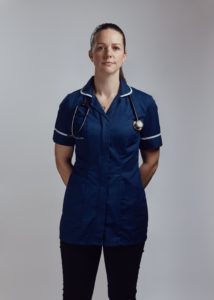Tiffany Smith
Tiffany is our Lead Major Trauma Nurse and features in episode one of Emergency as she treats Peter who was brought to St George’s after having been crushed by a 400kg air compressor.
Here we catch up with her…
How long have you worked at St George’s? What made you think St George’s was the place for you?
I have worked at St George’s for almost 10 years, I always knew I wanted to be a part of St George’s from early days as a student nurse, the complex and varied speciality amazed me, I was so impressed with the incredible expertise and talented people all working under one roof.
Can you tell us about your specific role?
As lead nurse for Major Trauma I manage a team of four major trauma nurse practitioners. Our team is clinically involved in seeing, assessing and managing major trauma patients from admission, throughout their hospital journey and to discharge and onwards, with our polytrauma patients coming back to our follow up clinic for ongoing medical/nursing/rehab and psychological support.
I work alongside our colleagues across the south west London and surrey Trauma network to provide liaison and support to major trauma patients that need to be transferred to St George’s from smaller hospitals called trauma units or if we are repatriating a trauma patient back to their local hospital for ongoing rehab.
What made you want to get into this area of nursing?
I have always had a passion for emergency and critical care. I love the fast paced and life saving decision making, doing your best to make a difference to a patient’s journey and not knowing what is going to happen next. This interest and foundation of my nursing career then naturally led onto my role specifically in major trauma, the combination of delivering care and treating patients in the first moments to being able to follow them through the journey to ITU and the wards, being part of their rehab and recovery was the dream role I wanted to do.
How did you find filming for Emergency?
It was an enjoyable experience having the opportunity to showcase the incredible work that happens every day in St George’s. It was different to the way 24 hours in A&E is filmed as you had a mobile camera crew following you around, however you tried to forget they were there and focussed on the job.
I think it was brave of patients to be involved through life changing experiences – sharing their story and experience will touch so many people in different ways.
What has been your favourite part of being involved with the series?
I have just enjoyed being part of a series that has shown the amazing pre-hospital and emergency care that happens within the first few hours to save lives to the outstanding work that happens daily in the hospital to start piecing our patients back together aiming to return them back to a quality of life that is as good as we can.
Why did you want to be a part of this series?
The series gives the public insight around the background of the major trauma system across London and beyond that many people will be unaware of.
It explains what a major trauma centre is and how this differs to a trauma unit, however it nicely shows how we all work together to provide a network of care for trauma patients across the country. Through the stories of our patients it shows how the combined work of doctors, nurses, physiotherapists, occupational therapists and clinical psychologists provide this care to very complex cases.
What would you say to someone who is interested in progressing into a similar career to you?
Use every opportunity that presents itself to you, spend time gaining varied experience in emergency and critical care to build up those skills and experience, It is interesting to be able to work with trauma patients across the spectrum of emergency care and ward rehab both in an major trauma centre and trauma unit.
The role is incredibly rewarding and gives you an opportunity to work, care and support patients and their loved ones in often the most difficult time of their life sharing their lows and often successes in their recovery and rehab. It really makes you appreciate life in a new perspective.


